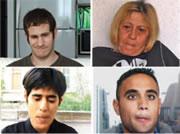 He could inherit mom or dad's smile.Getty
He could inherit mom or dad's smile.GettyHas anyone ever told you that you have the same expressions as your siblings or parents? You might think you picked that up by hanging around with your family too long. But scientists now say that such family 'signatures' may be genetic.
To separate the impact of mimicry from genetic inheritance, scientists at the University of Haifa, Israel, looked at people who were born blind.
The authors note that their blind subjects considered it to be a common public misconception that they can learn expressions by touch. The participants said that without a mental model of what a face looks like, it is hard to translate expressions felt through the hands to expressions on their own face.
Matchmakers
Eviatar Nevo and his colleagues asked their 21 blind participants, along with 30 relatives of these people, to reflect on a particular memory or idea that evoked emotion, and filmed the results. By the end of the interviews they had catalogued 43 different types of facial expressions (several being sequences of expressions), some of which were shared between people.
 Running in the family: expressions are similar between blind participants (left) and their relatives (right).PNAS
Running in the family: expressions are similar between blind participants (left) and their relatives (right).PNASThe researchers then had a computer crunch through the facial expressions and attempt to match them up. But because there were so few participants in the trial, they did this in a complex way to improve their statistics. For a given blind person, they divided the remaining participants into two groups at random, and looked to see whether the blind volunteer's facial expression better matched group 1 or group 2. They did this over and over again, dividing the participants into two groups using every possible combination.
The researchers found that a blind person's expression was matched to the group that contained their family members 80% of the time. That convinced the team that there was a hereditary signature behind the smiles and grimaces.
Of all the expressions, anger was the most likely to be similar between relatives, followed by surprise, disgust, joy, sadness, and finally, concentration. The results are reported in the Proceedings of the National Academy of Sciences1.
Familiar face
Studies have been done on universal similarities of facial expression before. Anger, for example, looks roughly the same from one culture to the next. Even Darwin remarked some 130 years ago that blind people have broadly the same facial expressions as sighted people.
ADVERTISEMENT
But few of these studies have delved into family resemblances. Some previous work with twins has shown that they share similar expressions of happiness and fear, but in most cases these twins lived together and so the work didn't rule out mimicry as the cause for similarities.
Using blind subjects opens up a new avenue of exploration. "The whole idea is incredibly interesting," says Thomas Bouchard Jr, a psychologist at the University of Minnesota in Minneapolis. "Knowing that they have never seen their family's expressions; it's an unusual approach," he says.
The next step is to try and find the genes responsible. Such information would be useful in the study of disorders in which facial expression is impaired.
Visit our yoursmileinyour_genes.html">newsblog to read and post comments about this story.
-
References
- NevoE., et al. Proc. Natl Acad. Sci, 103 . 15921 - 15926 (2006).
